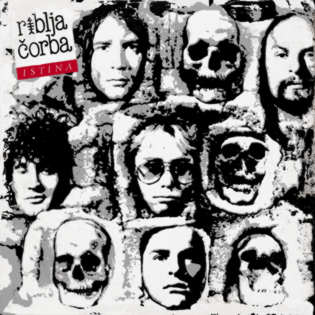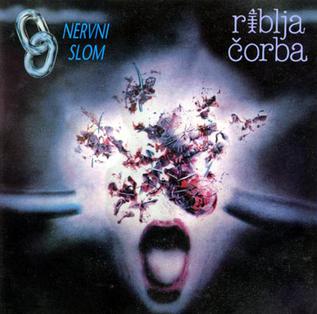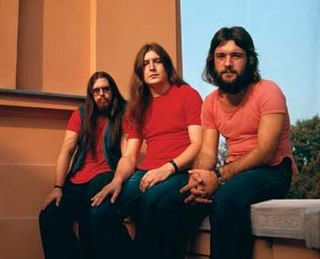
Kerber is a Serbian and Yugoslav hard rock band formed in Niš in 1981.

Riblja Čorba is a Serbian and former Yugoslav rock band formed in Belgrade in 1978. The band was one of the most popular and most influential acts of the Yugoslav rock scene.
Generacija 5 is a Serbian and Yugoslav rock band formed in Belgrade in 1977.

Nebo je malo za sve is the debut studio album from Serbian and Yugoslav hard rock band Kerber, released in 1983.

Ljudi i bogovi is the fourth studio album from Serbian and Yugoslav hard rock band Kerber, released in 1988.

Peta strana sveta is the fifth studio album from Serbian and Yugoslav hard rock band Kerber, released in 1990.

Zapis is the sixth and latest studio album from Serbian and Yugoslav hard rock band Kerber, released in 1996.

Istina is the sixth studio album released by Serbian and former Yugoslav rock band Riblja Čorba.

Mrtva priroda is the third studio album from Serbian and former Yugoslav rock band Riblja Čorba, released in 1981.

Večeras vas zabavljaju muzičari koji piju is the fifth studio album from Serbian and former Yugoslav rock band Riblja Čorba.

Osmi nervni slom is the seventh studio album released by Serbian and former Yugoslav rock band Riblja Čorba in 1986.

Ujed za dušu is the eighth studio album by Serbian and former Yugoslav rock band Riblja Čorba, released in 1987.

Zona B is a Serbian and Yugoslav blues rock band formed in Belgrade in 1987. They are one of the most prominent blues rock acts of the Serbian and Yugoslav rock scenes.

Nikola Čuturilo, also known as Čutura is a Serbian rock musician. He is known as a guitarist for the band Riblja Čorba, as well as for his solo work.

Sabrana dela is a 7 piece box set from the Serbian and Yugoslav hard rock band Kerber, released in 2009. Sabrana dela features remastered versions of all six studio albums released by the band, and the previously unreleased track "Sveti Nikola" on the seventh disc.

Antologija 1983–1998 I is the first compilation album by Serbian and Yugoslav hard rock band Kerber, released in 1998. It was the first of two compilation albums the band released in 1998, the second one being Antologija 1983–1998 II. The album features songs from the band's studio albums released during the 1983–1996 period.

Antologija 1983–1998 II is the second compilation album by Serbian and Yugoslav hard rock band Kerber, released in 1998. It was the second of two compilation albums the band released in 1998, the first one being Antologija 1983–1998 I. The album features ballads and acoustic songs from the band's studio albums released during the 1983-1996 period.

Arsen & Bora Čorba Unplugged `87 is the bootleg recording of the unplugged concert Croatian singer-songwriter Arsen Dedić and Serbian rock musician Bora Đorđević held in Terazije Theatre in Belgrade on March 6, 1987. The album is included in the official Bora Đorđević discography.

Pop Mašina was a Yugoslav progressive rock band formed in Belgrade in 1972. Pop Mašina is considered one of the most prominent bands of the 1970s Yugoslav rock scene.
Aleksandar "Saša" Habić is a Serbian and former Yugoslav musician, record producer and composer. During his career as a producer he worked with artists like Piloti, Divlji Anđeli, U Škripcu, Jakarta, Beograd, Dorian Gray, Laki Pingvini, Bebi Dol, Željko Bebek, Luna, Laza Ristovski, Slomljena Stakla, Bajaga i Instruktori, Zana, Kornelije Kovač, Alisa, Dejan Cukić, Oktobar 1864, Rambo Amadeus, YU grupa, Galija, Nikola Čuturilo, Riblja Čorba, Kerber, Vampiri, Ruž, Regina, Van Gogh, Generacija 5, Familija, Smak, Zdravko Čolić, Dragoljub Đuričić, Cactus Jack, and others.

















